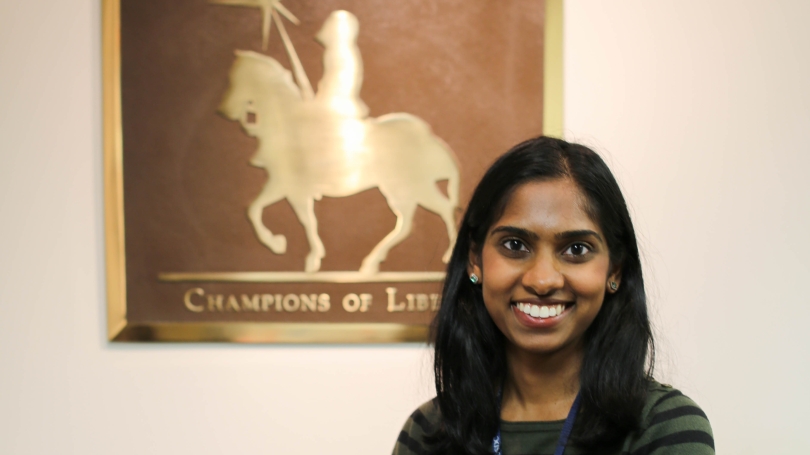
- Public Policy
- Leadership
- Funding
- News & Events
- About the Center
Back to Top Nav
Back to Top Nav
Back to Top Nav
Back to Top Nav
Abhilasha Gokulan '18 interned with the Public Defenders Service for the District of Columbia (PDS) during the Summer 2017 term. The following is an excerpt from her internship report.
This summer, I worked at the Public Defenders Service for the District of Columbia (PDS). Established in the 1960s, PDS is federally funded and provides legal representation to indigent adults and juveniles facing incarceration in the District of Columbia. Although PDS has several divisions, I mainly worked in the Parole Division and the Trial Division. In the Parole Division, I worked with clients who violated a term of their Parole conditions and were usually incarcerated while awaiting a Final Revocation Hearing before the Parole Commission. In the Trial Division, PDS tends to represent those adults facing Felony 1 cases or the most serious types of case.
At the internship, my duties included assisting attorneys, law clerks, and investigators with the investigations for parole revocation hearings and criminal trials. We would meet with our clients in jail to determine which investigation avenues would be most useful. After writing investigation memorandums, my tasks would include locating witnesses and complainants who are relevant to the criminal charges and taking statements from them. I would also contact clients’ family members and employers to receive letters of support and employment confirmation for the Final Revocation Hearings for Parole. Other investigation tasks included performing criminal background checks on parties of interest in our cases, conducting crime scene investigations, canvassing the crime scene, preparing exhibits, and assisting with case development.
One aspect of this internship that I particularly enjoyed was the fact that I gained several skills that I know will be useful in my everyday life and future career path. By assisting in trial and parole cases, I was able to better understand legal jargon and comprehend how a case proceeds through the judicial system. I was also able to witness this firsthand by being provided the opportunity to watch all parts of a case from the preliminary hearing to the trial to the closing statements. Additionally, D.C. has some legal differences compared to other states, such as not requiring the government to reveal all of the information about the actual criminal charge other than usually nothing more than the police report. Because of this, it was always crucial to be able to determine who the unnamed witnesses were by investigating the client’s background, the crime scene, and other random avenues. Through interactions with clients, their families, witnesses, complainants, and other parties such as Court Clerks, owners of stores with surveillance cameras, I had to learn how to be quick on my feet when it comes to differentiating my demeanor and attitude based on the context. In the Parole division, we aren’t given subpoena power, so part of my job included encouraging people to give us information, even though the law didn’t legally require them to do so. All of these tasks have enabled me to become a better investigator, communicator, and advocate.
I can confidently say that The Rockefeller Center equipped me with the necessary tools to succeed at my internship. I’ve participated in both D-Lab and MLDP; both of these programs definitely taught me to be more professional and how to interact with others in a work setting. The way my internship was set up included having an intern partner during my entire time at PDS. Without the skills I learned in these Rocky programs, I wouldn’t have been able to work with my partner as efficiently and as problem-free as we were able to. Being a Rocky Student Staff member also taught me how to work independently when needed and take risks or make my own tasks if I felt they were necessary. Finally, I’d like to thank the Rockefeller Center for providing me with the funding for my internship, specifically the Mr. E. John Rosenwald Jr. '52 Public Affairs Fund Named Internship. Without this funding, my internship would not have been possible, and I am truly grateful for the opportunity I received.